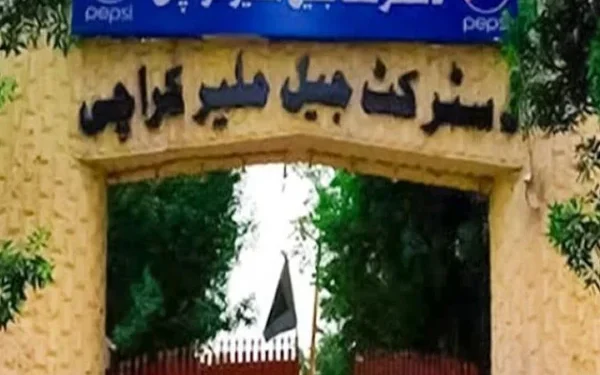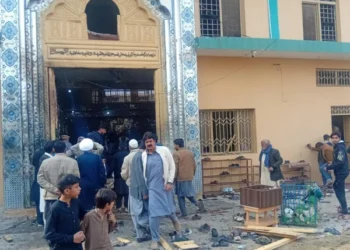Karachi, A major security lapse has come to light in Pakistan’s largest city after more than 200 prisoners escaped from Malir District Jail—also known locally as Bacha Jail—late Sunday night. The jailbreak has triggered widespread panic, a massive manhunt, and serious questions about the state of prison security in Sindh.
The Escape: Prisoners Break Free Amid Gunfire and Panic
According to initial reports, the jailbreak occurred late at night when chaos broke out inside the prison. The sound of heavy gunfire both within and around the jail compound sent shockwaves through nearby residential areas, causing fear and unrest among the local population.
SSP Malir Kashif Aftab Abbasi confirmed that the situation escalated rapidly, prompting a swift response from law enforcement agencies, including a large contingent of police officers and Pakistan Rangers. Security personnel quickly cordoned off the entire area, including the Malir Jail, adjacent villages, and the National Highway, which was temporarily closed to traffic on both sides.
Contradictory Reports on Cause of Jailbreak
While some early reports claimed that earthquakes that jolted Karachi multiple times earlier in the day may have weakened the prison structure, allowing prisoners to escape, this theory was later dismissed by officials. Sindh Home Minister Zia-ul-Hassan Lanjar clarified that no part of the wall was breached. Instead, he revealed that over 800 inmates were gathered outside the barracks, possibly as part of routine activities or precautionary measures following the tremors.
Taking advantage of the disorder and perceived opportunity, a large number of inmates reportedly attacked the jail staff, turning the prison into what eyewitnesses described as a “battlefield”.
Injuries and Casualties Reported
In the struggle to regain control of the prison, security forces opened fire to suppress the violent inmates. The confrontation left five personnel injured, including Frontier Corps (FC) officials, and two inmates were killed in the chaos. The injured personnel were later shifted to nearby hospitals for treatment.
Operation Launched to Recapture Escapees
Soon after the incident, authorities launched an extensive search and recapture operation. Special security teams began combing nearby areas such as Sukhun Police limits and Kohi village, where several fugitives were reportedly hiding. So far, officials confirm that more than 80 escaped prisoners have been rearrested, while nine suspects have been detained on suspicion of assisting in the escape.
In a rare and touching moment, an escaped prisoner voluntarily returned to jail with his mother, a story that has been widely praised on social media as a testament to personal integrity and familial values.
Widespread Security Measures Enforced Across Karachi
In an effort to prevent escapees from fleeing the city, security agencies have sealed off all major transportation routes, including the Karachi railway station, bus terminals, and nearby highways. Announcements have also been made in local mosques across Malir, urging citizens to report sightings of any escaped prisoners. Authorities have appealed to the public to remain vigilant and cooperate with security agencies.
Government Reaction and Orders for Inquiry
The gravity of the incident prompted immediate action from high-level government officials. Sindh Home Minister Zia-ul-Hassan Lanjar and Sindh Prisons Minister Ali Hassan Zardari have both demanded a comprehensive report from the Inspector General (IG) Prisons and Deputy Inspector (DI) Prisons. The ministers have vowed that negligent officers will be held accountable, and action will be taken at the highest levels of government.
DIG Prisons Hassan Sahto and DG Rangers Sindh Major General Muhammad Shamrez also visited the jail to assess the damage and discuss security reinforcements.
Preliminary Findings and Investigations
According to jail authorities, Malir Jail currently houses approximately 6,000 inmates, making it one of the largest prisons in Pakistan. A detailed audit and headcount is currently underway to determine the exact number of inmates still at large. Early assessments point to serious administrative lapses, including poor monitoring of prisoners, insufficient manpower, and inadequate emergency preparedness.
Officials close to the investigation report that criminal cases are being registered against the escaped inmates. Charges will include jailbreaking, assault on law enforcement personnel, and potentially terrorism-related provisions, depending on the individual records of the fugitives.
Political and Public Repercussions
The jailbreak has sparked a fresh debate over the state of prison management in Sindh and across Pakistan. Critics argue that the overcrowded and under-resourced jail system is a ticking time bomb. Human rights organizations have long warned that such facilities lack the infrastructure, personnel training, and surveillance capabilities to prevent incidents of this scale.
Civil society leaders and opposition parties are also calling for a judicial inquiry into the jailbreak and questioning the performance of Sindh’s Home and Prison ministries. The incident has renewed concerns over internal security, especially given Karachi’s sensitive geopolitical and socio-economic status.
Calls for Prison Reform Grow Louder
Security experts and social analysts are urging the government to take this incident as a wake-up call. Experts recommend comprehensive prison reform, including:
- Upgrading physical infrastructure to prevent future jailbreaks.
- Digitizing inmate records and enhancing biometric verification systems.
- Increasing the strength of trained security personnel within prison facilities.
- Deploying modern surveillance systems, including drones and AI-powered monitoring.
- Introducing rehabilitation programs to reduce repeat offenses and jail violence.
Conclusion: A Test for Law Enforcement and Governance
The Malir Jail jailbreak is one of the most significant prison breakouts in Pakistan’s recent history, exposing major flaws in the penitentiary and law enforcement systems. With over 200 prisoners escaping, and dozens still at large, this incident has become a test of the efficiency and responsiveness of Sindh’s law enforcement agencies.
While the recapture efforts are ongoing, the event has underlined the urgent need for structural reforms, better crisis preparedness, and transparency in prison administration. As the public awaits a detailed investigation report, the government’s next steps will be closely watched—both for justice and long-term reform.

























